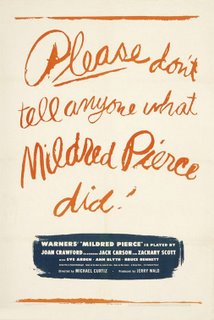Heart of darkness

 I know I had promised that the last entry would address noirish melodramas, but I couldn't resist that Trog one-sheet featuring the late, great J.C. (As I've explained to A & L, Norman doesn't worship Jesus Christ.) That exploitation-cheapie poster is not entirely unrelated, as Ms. Crawford happened to star in -- and garnered her only Oscar for -- Mildred Pierce (1945), which may be the most effective blend of key elements of melodrama and film noir.
I know I had promised that the last entry would address noirish melodramas, but I couldn't resist that Trog one-sheet featuring the late, great J.C. (As I've explained to A & L, Norman doesn't worship Jesus Christ.) That exploitation-cheapie poster is not entirely unrelated, as Ms. Crawford happened to star in -- and garnered her only Oscar for -- Mildred Pierce (1945), which may be the most effective blend of key elements of melodrama and film noir.Last weekend I went to a screening of two other such blends, Ruby Gentry (1952) and Beyond the Forest (1949). By way of introduction, a talking head remarked that, as so-called woman's pictures, this pair of films are not strictly noirs. But, to my mind, some of these weepie hybrids are closer to noir's dark heart than certain policiers, procedurals, detective stories, heist films and so on. For instance, in T-Men (1947), which as it its title suggests, follows a couple of treasury agents' crime-busting exploits, the agents are immovable figures of rectitude, who never succumb to the temptations of their undercover lives and identities (if they're tempted at all) as they navigate and unearth an elaborate criminal enterprise. T-Men indeed employs the dramatic chiaroscuro lighting typical of noir -- its cinematography is a real standout -- but the film's dark, grasping shadows do not extend to its themes. T-Men's noir credentials are ones of visual style, not narrative content. (In Mildred Pierce, Ms. Crawford's title character is basically a pure victim, but other characters and institutions we would normally expect to be good, most notably the daughter of a devoted, self-sacrificing mother, are corrupt or thoroughly rotten.)
Ruby Gentry and Beyond the Forest, which were directed by King Vidor and are, in all fairness, ripe for earnest revival, share certain elements. The films' respective central characters, Ruby (Jennifer Jones) and Rosa Moline (Bette Davis), are unstable, at times scary women with unfulfilled longing and proficiency with a shotgun. In comparison to Rosa, Ruby is more victim than villain, though she tends to wield her hammer of justice like the blunt, unforgiving tool that it is. Although both films are overwrought but unfairly maligned, Forest is more coherent, effective and entertaining. Neither its critical reputation as a "camp classic" nor any mere plot summary does the film justice. Its appeal lies largely in well-crafted dialogue, particularly admittedly outrageous lines delivered by Ms. Davis in a casually devastating manner; her overall performance as Rosa, who remains remarkably sympathetic for much of the picture; and an extravagant visual style. Ostensibly made, like most melodramas, for a predominantly female audience, both Ruby Gentry and Beyond the Forest nonetheless seem, no less than certain hardcore noirs featuring a ruthless femme fatale, to reflect a paranoid male fantasy: Beware women with ambition. And deadeyed aim.
Ruby Gentry, which is available on DVD, and Beyond the Forest, which inexplicably is not, were featured last weekend at the Egyptian here in L.A. as part of the American Cinematheque's annual noir program, which concludes this weekend. T-Men, which recently had its Turner Classic Movies premiere on cable, has been included on the programming slate for the yearly Film Noir Festival in Palm Springs in early June.

2 Comments:
Well, damn, Norman. Your description of RUBY GENTRY the other day was breathlessly exciting; now, though, it sounds as if Bette's got the upper hand.
I should've just gone with you and seen them both myself.
I'm too out of shape to describe both films in a single conversation.
Post a Comment
<< Home